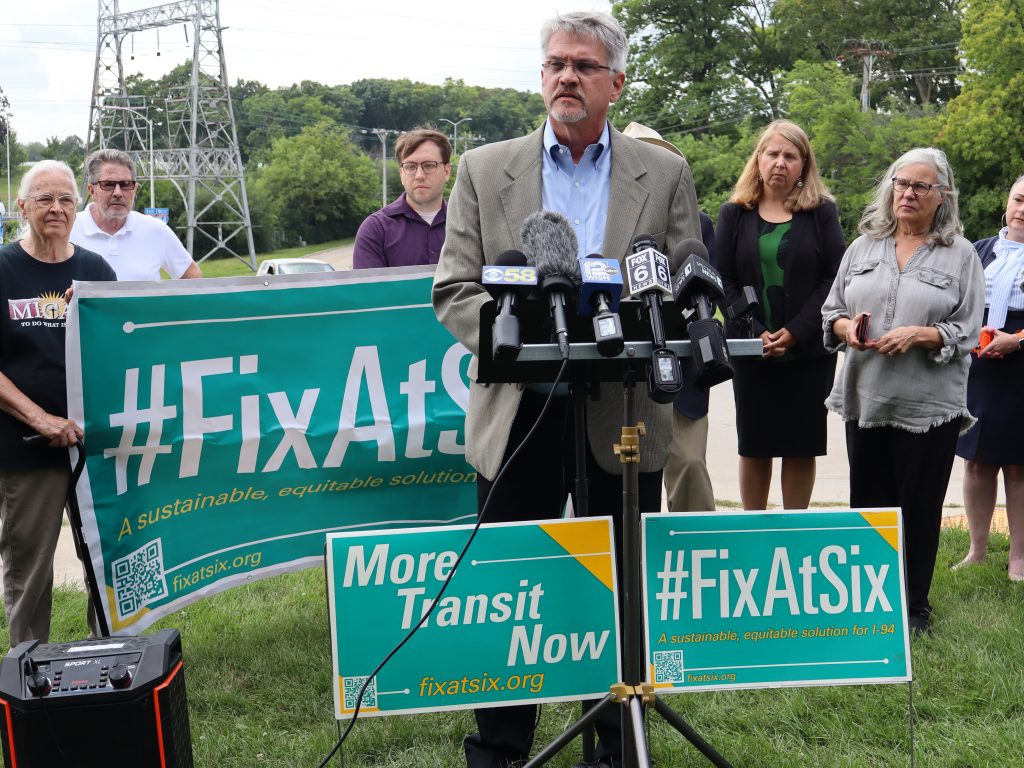Fix At Six Coalition Sues State, Federal Government Over I-94 Expansion
Suit charges planners didn't consider other alternatives or impact on nearby communities.

Attorney Dan Gustafson speaks at press conference announcing lawsuit agains I-94 expansion. Photo taken Aug. 19, 2024 by Graham Kilmer.
A coalition of advocacy organizations is suing state and federal transportation agencies over a plan to expand I-94 and the Stadium Interchange.
The complaint, filed Monday on behalf of the Coalition for More Responsible Transit, alleges that the Wisconsin Department of Transportation (WisDOT) and the Federal Highway Administration (FHWA) did not adequately consider alternatives to expansion, and that in pushing forward expansion the agencies have failed to consider the harm to project will cause to nearby residents, a majority of whom are people of color.
“State and federal transportation officials used an incomplete and highly selective environmental analysis to justify moving ahead with a project, add greenhouse gas emissions and reinforce a long standing pattern of neglecting public transport,” said Dan Gustafson, an attorney with Midwest Environmental Advocates, which is representing the plaintiffs along with the Legal Action Wisconsin.
The ‘Fix at Six’ coalition, which pushed for retaining a six-lane freeway, is comprised of four environmental, public health and social justice organizations, including the Milwaukee Inner City Congregations Allied for Hope (MICAH), Milwaukee Riverkeeper, Sierra Club – Wisconsin Chapter and 1000 Friends of Wisconsin. MICAH was part of a federal lawsuit that successfully sued the state over the Zoo Interchange project, leading to a settlement that included new funding for public transportation in Milwaukee.
The coalition has been advocating for an alternative to highway expansion that would involve fixing the safety and operational concerns along the project area and using the funding slated for expansion, instead, on improving public transportation for the region.
The expansion is estimated to cost between approximately $1.5 and $1.75 billion.
“And we believe that these funds can better serve the community through public transportation, that there are those who are in need of means to get back and forth to work, to be able to receive the health care that they need, also to just have a life with peace and a neighborhood with peace,” said Pastor Richard Shaw.
Opponents, including many from the organizations that joined the lawsuit, have argued that highway expansion, especially along this corridor, will worsen air pollution and health outcomes, particularly respiratory conditions like asthma; that it will not improve access to jobs or bolster the local economy, and could potentially make access to jobs worse for some residents; that it could worsen racial segregation; and that it will make flooding and polluted rain runoff worse in the surrounding areas, impacting the wider health of Milwaukee’s rivers and streams.
WisDOT pursued the project because the roadway, built in the 1960s, is in poor condition and features dangerous design elements like left-hand entrances and exits.
In 2022, WisDOT identified highway expansion as the project it would pursue along I-94. In March this year it received a thumbs up from FHWA, a constituent agency of the U.S. Department of Transportation, clearing the way to finalize plans and begin construction. Construction is planned to begin in 2025 and finish in 2031.
According to the WisDOT study, the six-lane option would cost only between 3% to 6% less. However, the actual ‘Fix at Six’ plan authored by transportation planner Mark Stout was not the exact proposal the state evaluated.
The project is currently under investigation by the U.S. Department of Justice for civil rights violations, and advocates have called on WisDOT to pause moving forward at least until the civil rights review is complete.
The coalition’s lawsuit is challenging the planning process, arguing it has run afoul of the National Environmental Policy Act, Gustafson said. The suit is seeking an injunction against the project, and for the agencies to pause and reconsider fixing instead of expansion and making public transportation investments, said Karyn Rotker, with Legal Action Wisconsin.
The evidence the plaintiffs plan to present includes the hundreds of pages of comments and exhibits that opponents of the project have submitted since WisDOT began working on it.
Rotker said the proposed I-94 expansion represents a potentially “even worse” impact on Milwaukee residents than the Zoo interchange project, “because the Zoo Interchange was not quite as closely on top of human beings who live adjacent to the highway.”
The case the groups are bringing against the project is at least as strong as the one brought against the Zoo Interchange project, she said. “I think it may well be stronger.”
If you think stories like this are important, become a member of Urban Milwaukee and help support real, independent journalism. Plus you get some cool added benefits.
More about the I-94 East-West Expansion
- Transportation: 27th Street Bridge Closes Next Week - Graham Kilmer - Jan 26th, 2026
- Transportation: 27th Street Bridge Will Close For A Year - Graham Kilmer - Nov 29th, 2025
- Coalition Raises Concerns on I-94 Construction - Sierra Club - Nov 12th, 2025
- Construction Starting On $1.7 Billion Interstate 94 Widening - Jeramey Jannene - Oct 15th, 2025
- Governor Evers approves first segment of I-94 East-West construction to begin in Milwaukee County - Wisconsin Department of Transportation - Oct 15th, 2025
- Transportation: Fix At Six Coalition Sues State, Federal Government Over I-94 Expansion - Graham Kilmer - Aug 20th, 2024
- WisDOT to host I-94 East-West Freeway Project public meetings - Wisconsin Department of Transportation - Jun 12th, 2024
- Open Houses Announced For I-94 Widening - Jeramey Jannene - Jun 6th, 2024
- ‘Fix at Six’ Group Wants I-94 Expansion Delayed For Civil Rights Report - Jeramey Jannene - Mar 20th, 2024
- Coalition Admonishes I-94 expansion Record of Decision - Sierra Club - Mar 20th, 2024
Read more about I-94 East-West Expansion here
Transportation
-
Congestion Pricing Cuts Air Pollution in New York City
 Dec 14th, 2025 by Jeff Wood
Dec 14th, 2025 by Jeff Wood
-
FTA Tells Milwaukee to Crack Down on Fare Evasion — Even Where Fares Don’t Exist
 Dec 12th, 2025 by Graham Kilmer
Dec 12th, 2025 by Graham Kilmer
-
Will GOGO’s Bus Service Ever Get Going?
 Dec 9th, 2025 by Jeramey Jannene
Dec 9th, 2025 by Jeramey Jannene





















In a new book, City Limits: Infrastructure, Inequality, and the Future of America’s Highways, author Megan Kimble tells the story of two worlds: the people working to plan and build highways and a separate world of people displaced by and fighting this construction. She describes this multi-decade and multi-faceted conflict and the changing generations involved. Ultimately, Kimble uncovers an important conclusion about this struggle and a way forward that could help reclaim the future of cities in the American landscape.
Kimble focuses on case studies in Texas involving expansion plans of I-35 in Austin, I-345 in Dallas, and I-45 in Houston. However, as she describes, the same type of conflict has played out over decades in hundreds of different places. Freeway builders tap a bottomless well of money and power and work relentlessly to plan and expand highways and steamroll over community feedback, local conditions, empirical evidence, and common sense. The people opposed to freeway expansion, forming ad-hoc groups, struggle with dislocations in their communities and grapple with highway plans. These freeway fighters seek to confront the freeway builders and gain some control over their neighborhoods but end up in lengthy battles they usually lose.
This conflict seems intractable, but by the end of this book, the author reveals the hidden factor that keeps this conflict locked in place: the ideology that holds highways as the rightful, perpetual disruptor of cities. This highway ideology remains unspoken while open conflicts play out: highway expansion proponents and freeway fighter opponents engage in a public drama with rote lines and formulaic rhetoric in a repertory theater of the absurd that leads to the same ending nearly every time. Meanwhile, the unexamined author of this drama–the freeway ideology–keeps the game fixed against anything but perpetual highway expansion.
This struggle between highway ideology and communities is a story that has continued for almost 70 years in the US and worldwide. Kimble’s book plays a vital role in updating us on a new generation of people working to counter highway expansion. Most importantly, Kimble’s book peels back history and reveals a key to unlocking this conflict: a re-examination of the ideologically-driven policy decisions and assumptions that place highways and suburban mobility over–literally on top of and displacing–urban health, equity, livability, and prosperity. https://johndecember.com/places/people/kimble2024.html
I doubt that of any of the parties involved in this lawsuit represent people who get stuck in the daily merge issues that occur in both directions where the lanes drop from 4 to 3. I’ve attended the meetings on this project and the DOT had done a good job of minimizing the impact on adjacent areas, many of which are primarily industrial or institutional.
Something needs to be done there. The lanes are so narrow already that you white knuckle it when you drive it WB between 13th street to the Stadium. Many people also disregard the solid white lines on the roadway, which means do not pass or change lanes…but they still do. Unless you can limit the amount of cars and trucks (oh, so many trucks!) it is only going to be much, much worse.
I’ll have to check out Megan Kimble’s book.
I follow City Nerd and Strong Towns on YouTube, and each offer important views on traffic planning and used of space in cities.
City Nerd was an urban planner with a focus on urban traffic and had talked about the singular focus on highway planners with gross disregard for residents, pedestrians, and others as remote afterthoughts. His content on “strouds” is brilliant. Of course, vehicle traffic planning is important but highway planners misguided belief that continuing to expand will solve congestion is clear. We’ve literally been down that road since the 1950’s and that experiment has failed. Something needs to change.
And, the premise of Strong Towns is simple: Cities should look at land as opportunities to create wealth for municipalities and their residents. Especially important when looking at surface parking, etc., and the Hugh amount of unused parking (surface lots, structures and street parking) filled only when nonresidents visit for events…and even then… Also applicable to land currently used for under-used highways, and the surrounding “dead space.”
Again, no one is taking about eliminating all highways, and I am sure there is room for improvement in this case. As a city resident (Chicago), when I do need to drive, I want to be able to do it, but without the unjustified expectation of there being no traffic in front of me. (Thriving cities have traffic…it’s a sign that people want to be there!) Through traffic should be routed around major urban areas, not through downtown centers. If I go to a Brewers game, I should expect backups or, shocker, have the option to take convenient mass transit from another location.
Eliminate the inside entrance and exit ramps on I-94, problem solved!
No need for extra lanes to continue to line the pockets of the rich, road builders.